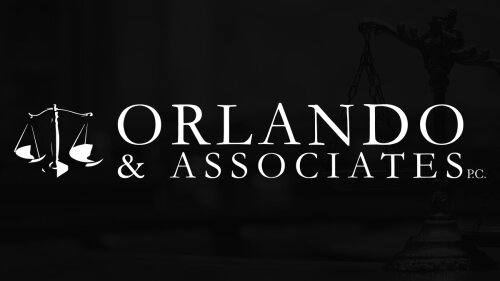Best ADR Mediation & Arbitration Lawyers in Virginia
Share your needs with us, get contacted by law firms.
Free. Takes 2 min.
Or refine your search by selecting a city:
List of the best lawyers in Virginia, United States
About ADR Mediation & Arbitration Law in Virginia, United States
Alternative Dispute Resolution, commonly known as ADR, includes methods such as mediation and arbitration for resolving legal disputes outside of traditional court proceedings. In Virginia, ADR is increasingly popular due to its efficiency, confidentiality, and cost-effectiveness compared to litigation. Mediation involves a neutral third party who helps the disputing parties reach a voluntary agreement, while arbitration is more formal and involves an arbitrator who makes a binding or non-binding decision after hearing arguments and reviewing evidence. These processes are widely used in Virginia in areas such as family law, business disputes, employment issues, construction, and more.
Why You May Need a Lawyer
Even though ADR offers a more informal setting than court proceedings, many individuals and businesses in Virginia choose to consult lawyers for guidance. Here are some common situations where legal help may be necessary:
- You are involved in a complex dispute where legal rights or significant assets are at stake.
- You need advice on whether mediation or arbitration is appropriate for your situation.
- You must interpret or draft an arbitration clause in a contract.
- You want help preparing for a mediation or arbitration session, including gathering documentation and formulating arguments.
- You are uncertain about the enforceability of an arbitration or mediation agreement in Virginia.
- You need a lawyer to represent you during mediation or arbitration to ensure your interests are protected.
- You want to challenge or enforce an arbitration award or mediated agreement in a Virginia court.
- You have concerns about fairness, neutrality, or potential bias in the ADR process.
Local Laws Overview
Virginia has established legal rules and guidelines to govern ADR processes, especially mediation and arbitration. The Virginia Arbitration Act provides a framework for conducting arbitrations, enforcement of agreements, and challenging arbitration awards. The Virginia Supreme Court also has rules that encourage and regulate court-referred mediation in civil cases. Both mediation and arbitration proceedings in Virginia are generally confidential, and information disclosed is protected in most cases. Additionally, Virginia courts often uphold the enforceability of mediation and arbitration agreements, provided they meet specific legal standards. However, some matters, such as certain criminal or highly sensitive family law issues, may not be suitable or eligible for ADR processes in Virginia.
Frequently Asked Questions
What is the difference between mediation and arbitration?
Mediation is a voluntary process where a neutral mediator helps parties reach a mutually agreed-upon resolution. Arbitration is a more formal process where an arbitrator hears both sides and issues a decision, which can be binding or non-binding.
Are ADR decisions enforceable in Virginia?
In most cases, arbitration awards are enforceable by law in Virginia courts. Mediated agreements can also be enforceable as contracts if both parties sign and agree to the terms.
Do I need a lawyer for mediation or arbitration?
While not legally required, having a lawyer can help you understand your rights, prepare your case, and represent your interests during ADR.
What types of disputes are commonly resolved through ADR in Virginia?
Common disputes include divorce and family law issues, business contract disagreements, employment disputes, construction claims, and consumer complaints.
Is ADR confidential in Virginia?
Yes, ADR processes such as mediation and arbitration are generally confidential under Virginia law, meaning what is discussed typically cannot be used in court later.
How do I start the ADR process in Virginia?
You can initiate ADR by agreeing with the other party to mediate or arbitrate, or by following a clause in your contract. You may also be referred by a Virginia court.
What happens if we do not reach an agreement in mediation?
If mediation does not result in an agreement, the parties can proceed to other forms of dispute resolution, such as arbitration or going to court.
Can I appeal an arbitration decision?
Arbitration decisions are generally final and binding, but in rare cases, a Virginia court may review an award for specific legal grounds like fraud, bias, or misconduct.
What qualifications do mediators and arbitrators need in Virginia?
Virginia maintains a roster of certified mediators for court-referred cases. Private arbitrators and mediators should have relevant training and experience, though certification is not always required.
How much does ADR cost in Virginia?
Costs vary depending on the mediator or arbitrator’s fees and the complexity of the dispute. Mediation is typically less expensive than arbitration and much less costly than litigation.
Additional Resources
You may find these resources helpful if you are seeking legal advice or services in ADR mediation and arbitration in Virginia:
- Supreme Court of Virginia - Office of Dispute Resolution Services
- Virginia State Bar - Lawyer Referral Service
- Virginia Department of Professional and Occupational Regulation
- American Arbitration Association (AAA)
- Association for Conflict Resolution - Virginia Chapter
- Local bar associations and legal aid organizations throughout Virginia
Next Steps
If you are considering mediation or arbitration in Virginia, here are practical steps to follow:
- Determine whether your dispute is appropriate for ADR by reviewing your contract or seeking initial advice.
- Consult a lawyer experienced in ADR for guidance on rights, process, and potential outcomes.
- Gather all relevant documents, contracts, and evidence related to your dispute.
- Contact a qualified mediator or arbitrator, or seek referrals from Virginia’s Office of Dispute Resolution or the Virginia State Bar.
- Prepare thoroughly for ADR sessions with your lawyer’s help to ensure your interests are fully represented.
- If an agreement or award is reached, follow through on legal steps for enforcement or court approval as necessary.
Lawzana helps you find the best lawyers and law firms in Virginia through a curated and pre-screened list of qualified legal professionals. Our platform offers rankings and detailed profiles of attorneys and law firms, allowing you to compare based on practice areas, including ADR Mediation & Arbitration , experience, and client feedback.
Each profile includes a description of the firm's areas of practice, client reviews, team members and partners, year of establishment, spoken languages, office locations, contact information, social media presence, and any published articles or resources. Most firms on our platform speak English and are experienced in both local and international legal matters.
Get a quote from top-rated law firms in Virginia, United States — quickly, securely, and without unnecessary hassle.
Disclaimer:
The information provided on this page is for general informational purposes only and does not constitute legal advice. While we strive to ensure the accuracy and relevance of the content, legal information may change over time, and interpretations of the law can vary. You should always consult with a qualified legal professional for advice specific to your situation.
We disclaim all liability for actions taken or not taken based on the content of this page. If you believe any information is incorrect or outdated, please contact us, and we will review and update it where appropriate.
Browse adr mediation & arbitration law firms by city in Virginia
Refine your search by selecting a city.









